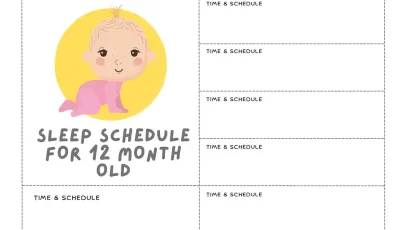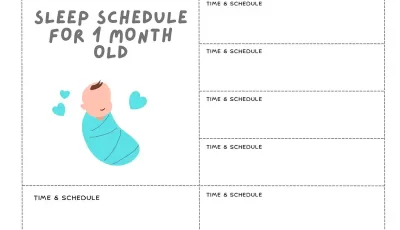With the crazy-busy lives of modern parents, it can be tricky to get our kids to bed on time. But you can do a few things to help create a 9 month old sleep schedule that works for both of you.
8 Powerful Tips for Coordinating a 9 Month Old Sleep Schedule
Here are some tips on coordinating a 9 month old sleep schedule.
1. Establish a 9 Month Old Sleep Schedule
Regular sleeping will help your child develop good habits. It will also help reduce sibling rivalry. Setting a regular sleeping will also make going to bed easier. Creating a 9 month old sleep schedule will assist your baby in falling asleep alone.
Having a set 9 month old sleep schedule can create a sense of order and predictability in your child’s life. This will help them to become more content and relaxed during the night. It is also important to make sure your child is comfortable before bed.
Read Also : The Ideal Sleeping Schedule for 3 Month Old
Ensuring they are wrapped in a warm bed sheet and have their favorite toy close by will help them fall asleep quickly. Finally, staying with your child until they fall asleep is important. Leaving them to sleep on their own can be stressful and may lead to problems such as nightmares or difficulty falling asleep in the future.
2. Have a set 9 Month Old Sleep Schedule.
When setting a 9 month old sleep schedule, you must have a developed time that both can stick to. This way, your little one knows what to expect and can wind down for bed. Make sure the time you set is reasonable and allows your child enough time to relax before sleep.
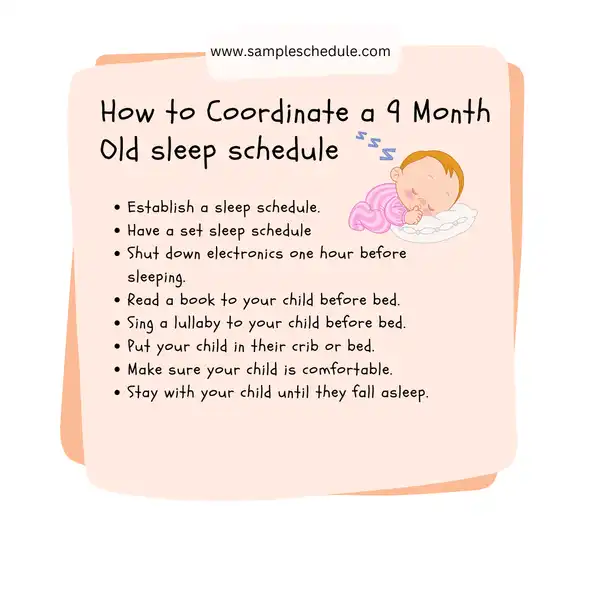
How to Coordinate a 9 Month Old Sleep Schedule
While it is essential to keep sleeping, it is also crucial that your baby has a full night’s rest. If they are not getting enough shut-eye, they will likely not be able to go to bed on the period the following night. To make sure your baby gets enough rest, follow these guidelines:
- Establish a sleep that allows your child enough time to wind down before sleep.
- Shut down electronics one hour before sleeping.
- Read a book to your child before bed.
- Sing a lullaby to your child before bed.
- Put your child in their crib or bed.
- Make sure your child is comfortable.
- Stay with your child until they fall asleep.
3. Shut down electronics one hour before sleeping.
One hour of screen time before bed is an excellent method to assist your child in winding down for sleeping. Shutting down electronics allows your child to rest and fall asleep easier.
You are turning off all screens an hour before bed creates a calming atmosphere for your child. Watching TV or using electronic devices before bed can cause sleeplessness, anxiety, and more. You are putting electronics away one hour before bed will assist kids in getting a good night’s sleep.
4. Read a book to your child before bed.
As parents, one of the best practices to assist your child in falling asleep is reading to them before bed. Reading not only allows children to relax, but it can also help them learn new things and develop a strong bond with you. Not only that, but by reading together before bed, you can create a special memory that your child can cherish for years to come.
Remember a few things before reading a book to your kid. For one, make sure the book you choose is appropriate for your 9-month-old. Some books are filled with complex words that may need to be easier for your small one to understand.
On the other hand, some books are stories with mild images that are easy for most toddlers to comprehend. Secondly, it’s important to read slowly and with expression. This way, your child can follow the story and absorb the information. And finally, stay with your child until they fall asleep – even if that means reading until they fall asleep themselves!
Reading together before bed isn’t just a great way to get your child ready for bed; it’s also a great way to build a strong relationship with them. You’ll create an ideal foundation for a healthy future by sharing positive memories.
5. Sing a lullaby to your child before bed.
When preparing your child for sleeping, a lullaby is an excellent method to assist them in asleep faster. A lullaby can even be a bonding experience between you and your child. Singing a lullaby before sleep can allow your child to sleep faster and remain asleep longer.
6. Put your child in their crib or bed.
When it arrives to sleeping, placing your child in their crib or mattress can be a great way to help them fall asleep faster. Cribs are a safe place for babies to sleep, and putting them in their beds will help them feel more secure.
Ensuring your child’s crib or mattress is comfortable is essential too. You can add a few blankets or pillows, dim the light, and ensure the room is completely closed when you leave. If everything goes well, you can leave your child alone to sleep!
7. Make sure your child is comfortable.
Often, when we attempt to bring our children to sleep early, they are not quite ready. To ensure that your child is comfortable and falls asleep quickly, taking a few steps beforehand is essential. Here are a few tips to follow:
- Make sure your child is fully clothed and comfortable before bed. This will help them feel less anxious and more relaxed.
- Ensuring the child’s mattress is comfortable and soft. A hard bed can cause discomfort and can lead to restless sleep.
- If your child has a crib or bed, ensure it is in a well-lit area. This will help minimize the occurrence of nightmares.
- Help your child find a comfortable position to sleep in. Some children lie down on their stomachs, while others sleep on their sides or back. See what performs best for your child, and stick with it!
- Keep the room temperature comfortable for your child. Try sleeping in a lightly clothed garment if it’s too cold, or use a blanket if it’s too warm.
8. Stay with your child until they fall asleep.
If you like to bring your little one to sleep on time, you can do a few things to create a schedule. One of the most important things is establishing a sleep schedule early so your little one knows what to expect. Here are some tips on coordinating a 9 month old sleep schedule.
- One of the best 9 month old sleep schedules to ensure your child falls asleep is to remain with them until they drift off.
- If you can support them in their crib or mattress until they are asleep, you’ll ensure they obtain the required sleep and avoid accidents.
- If your child is resisting falling asleep, don’t force them. Try reading a book or singing a lullaby to them before bed.
- Once they begin to calm down, it may be easier for them to sleep.
9 Month Old Sleep Schedule
The template can help you establish a predictable sleep routine that accommodates differences in your baby’s sleep patterns. This routine can give your baby the rest they need, which is crucial for their growth and development. It can also reduce stress and anxiety for you as a parent by providing a roadmap for your baby’s sleep needs.
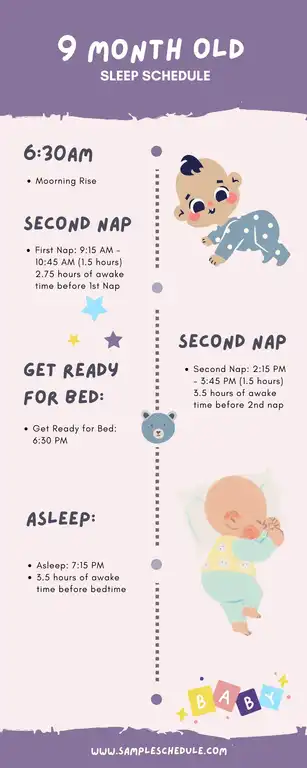
9 month old sleep schedule
Your baby is experiencing many new developments, and their sleep patterns are likely changing. They must get adequate sleep to support their development and growth, including physical, mental, and emotional growth. A lack of sleep can impact your baby’s mood, behavior, and ability to learn new skills.
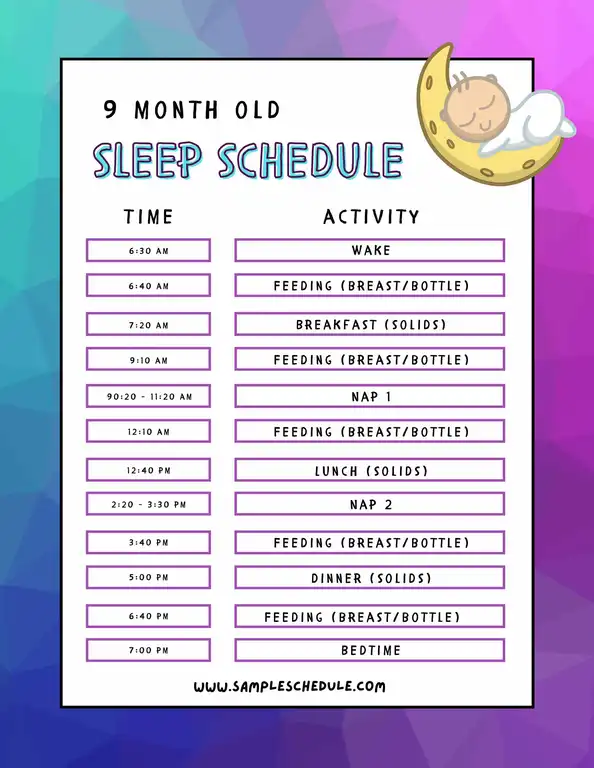
9 month old sleep schedule template
Key Benefits
- It helps you accommodate any changes in your baby’s sleep patterns
- Establishes a predictable sleep routine
- Reduces stress and anxiety for parents
- Supports your baby’s development and growth
Creating a Customized Sleep Schedule
When creating a schedule template, evaluating your baby’s unique sleep needs is important. Here is some advice to help you create a customized sleep schedule:
- Start by tracking your baby’s current sleep patterns
- Consider their feeding schedule and any other daily routines
- Please take into account any changes in their sleep patterns
- Make adjustments as needed to accommodate their changing sleep needs
Conclusion:
A 9 month old sleep schedule should include knitting down for the night, with plenty of downtimes for parents to spend with their children. Follow these tips to ensure your little one falls asleep on cue.
A schedule template can provide a roadmap for your baby’s sleep needs and help you navigate the changes in their sleep patterns. Establishing a predictable sleep routine can give your baby the rest they need to support their growth and development. A customized sleep schedule can help create a peaceful and harmonious home environment by reducing stress and anxiety for parents.
